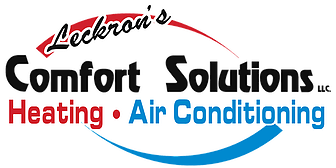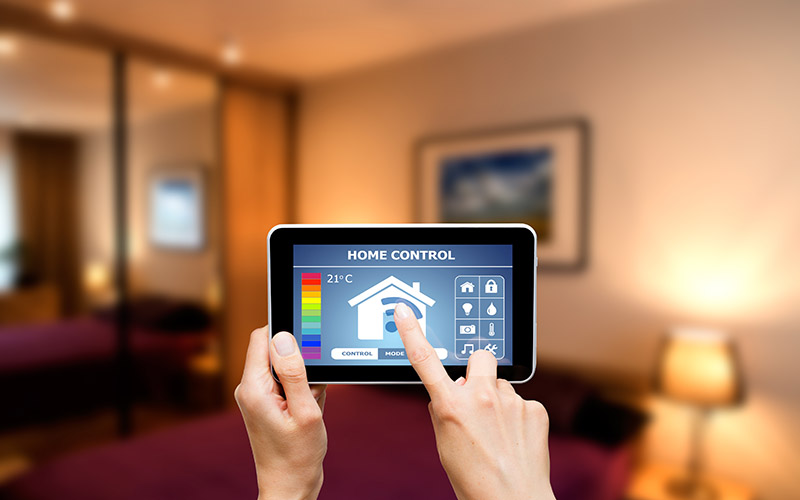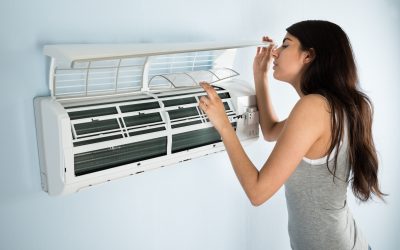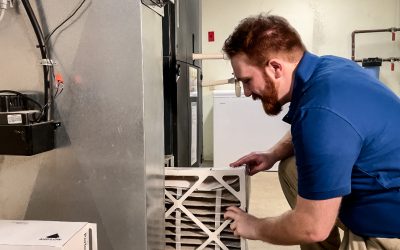“Alexa – play the top 100 playlist from the late ’90s.”
“Playing Truly, Madly, Deeply by Savage Garden.”
From Alexa to programming our lights to go on before we get home, smart technology has taken over our homes. Instead of answering the door, we speak to delivery people through our doorbells. Smart technology can even control the temperature of our homes based on our daily patterns.
What once was reserved for the wealthy has now become a requested feature for new homebuyers. The trend has even infiltrated HVAC systems. Our heating, ventilation, and air conditioning can include components such as temperature sensors, CO2 sensors, occupancy sensors, pressure sensors, and variable speed fans. These various factors work together to adjust how your home is heated based on a variety of factors, even including time and weather conditions!
With traditional systems, if you want your home to be a specific temperature, you adjust it manually. For example, when we want our home to stay around 70 degrees in the summer, we set our thermostat. If our blinds are open and the sun is warming the house, our AC will kick in and cool it down. So regardless if we are home, asleep, or on vacation – unless we manually change the temperature, we expect our house to be 70 degrees – even if that means wasting electricity.
Today, we can save energy and capitalize on smart technology by setting up times for our home to be out of ideal range, such as when we leave for work or sleep. CO2 sensors can monitor the air, and when the CO2 is too high, allow fresh air to be added to the home. Smart vents can open and close depending on the room’s temperature, and we can control blinds by electronic command.
By implementing Smart technology, homeowners can reduce their carbon footprint, save money, increase comfort, and improve air quality, while feeling safer at home. And this all comes with little thought past the initial programming of the system.
Energy Efficiency
Smart HVAC systems work by tracking the homeowner’s occupancy patterns or by a manual or factory preset; however, homeowners can adjust the home’s heating, cooling, and ventilation. Furthermore, homeowners can program certain rooms to be a different temperature than others. For example, a large living space that generally has many people gathered in it may be kept cooler to account for the additional people, while a home office may be kept slightly warmer.
It continues beyond just heating and cooling too. Homes that utilize Smart technology also can install Smart lighting and power strips or outlets. These lights can be set to turn on and off at certain times, ensuring lights only turn on closer to your arrival time. Likewise, power strips and outlets can automatically turn off when not in use and be set to turn back on.
All of these work together to equate to energy savings and a reduced carbon footprint. According to a 2018 American Council for an Energy-Efficient Economy report, smart zoning alone can save 10% in HVAC energy savings. When using smart ceiling fans, “One study demonstrated that with smart ceiling fans, it was possible to increase room temperature by 4°F without sacrificing comfort. The study resulted in average cooling savings of 4–11%.”
Smart water heater controls saved users between $50-$200 a year and from 9-18% energy savings. Finally, manufacturers of smart thermostats report customers have savings of 6-10% annually!
Cost Savings
HVAC thermostats allow us to set a temperature for when we are gone, asleep, and on vacation. We can even set different rooms to different temperatures, allowing more comfortable air where people tend to gather.
Similarly, smart power strips and outlets can be programmed, saving money when unused. Smart ceiling fans and blinds lower the need to kick on the HVAC system as often, thus reducing energy. The home’s temperature and humidity can even be adjusted according to the weather.
All of these translate to energy savings and, thus, a lower bill. Furthermore, some companies will work with homeowners to save money by participating in programs incentivizing them with time-of-use pricing, reducing their usage during peak times.
Automated Maintenance Alerts
One unique feature of smart HVAC systems that gives homeowners a sense of relief is their ability to use sensors to alert them of issues. For example, routine maintenance, like changing air filters, helps prevent equipment breakdown. When the system is due for service, an alert can be sent. If the system has a failure or change in performance, it alerts homeowners that they need to contact their HVAC company.
Remote troubleshooting
By sending alerts of issues, smart HVAC systems ensure technicians are adequately prepared to fix any problems. Instead of arriving and doing a full diagnostic check, specific issues are ruled out, and the problem is identified beforehand. This feature sends alerts directly to your HVAC company, allowing them to contact the homeowner.
Longer lifespan
When you take care of your system with maintenance and repairs, as well as not overburdening it with wasteful energy usage, it will last longer. Think of a car – if you don’t change its oil or give it tune-ups, it will likely need to be replaced sooner than one you have been diligent with its upkeep.
That said, life is busy and it can be hard to do all the things. Smart HVAC systems and their counterparts, allow you to let your system work for you. It takes one “to-do” off your list and yet, you still enjoy the satisfaction of a longer lifespan in your investment.
Comfort and Convenience
Nobody likes to feel uncomfortable in their home. From freezing in the cold winters to baking amid a sweltering summer, we seek refuge inside the walls of our homes.
Yet, we are not awake during all the moments of the day, nor do we spend all day inside. When we raise and lower the temperatures to save on energy, we awaken or come home to an uncomfortable atmosphere, waiting hours for the temperature to rise or lower to comfortable levels again.
Smart HVAC systems make this an obsolete concern. They learn your family’s patterns and auto-adjust to when you should be wakening and arriving home. This means that the home is already comfortable when you walk through the door versus waiting for the temperature to rise.
Blinds are opened or closed. Lights turn on, and outlets are powered up. Above all, your home is comfortable. Talk about convenience!
Voice Control
Smart HVAC systems are now able to be controlled by voice. Using Google Assistant or Amazon Alexa, you can turn up or down your heat/ac, create schedules, turn on or off lights, and even control your blinds.
Mobile App Control
Let’s face it – the world has reopened, and we are not always home. With mobile app controls, you can adjust your HVAC system from anywhere. Within your app, you designate room and set point temperatures, and you can enable modes like vacation mode. Additionally, you can alert your HVAC company when there is something amiss with your unit.
Integration with other smart home devices
Smart devices can work together. For example, if you have a smart coffee pot, lighting, radio, and HVAC system, you can program them to work in sync. When you say a command like “Good morning, House,” your coffee can start to brew, preset lights can turn on, your radio will play soft music, and your HVAC system will turn up to your desired indoor temperature.
Smart blinds or smart fans can open or close, and the fan can kick on. This is particularly useful during specific times of the day or sunny weather conditions. In addition, you get the bonus of decreasing your HVAC system’s wear and tear by utilizing natural heating and cooling.
Improved Air Quality
Indoor air is often worse than outdoor air. Our walls keep out uninvited guests like small animals and the occasional passerby, but they also keep in uninvited guests like dust, dander, CO2, Volatile Organic Compounds (VOC), and humidity.
Smart systems have sensors to pinpoint poor air quality. For example, if CO2 reaches an unacceptable level, the system can bring in fresh air. VOCs, caused by materials such as carpets, paint, plastics, and other daily household items, are another problem. Like CO2, a smart HVAC system can monitor their level, correcting or notifying you if they get too high.
Air duct monitors scan the air, alerting homeowners when fine dust is at risk of harming occupants. Smart humidifiers and dehumidifiers keep the air in optimal condition to prevent mold but not so dry that dust and viruses float in the air. Some HVAC systems use UV light to kill mold and other viruses as the air passes through.
Finally, high-quality filters changed regularly have a significant impact on collecting dust, viruses, and other contaminants that lead to respiratory issues. Smart HVAC systems can notify homeowners when to replace the filter. A report entitled “A critical review of heating, ventilation, and air conditioning (HVAC) systems within the context of a global SARS-CoV-2 epidemic” found that “results showed that before using the PAC with the HEPA filter, 75% of the samples were positive results, and the COVID-19 was found through the air, while after using the PAC with the HEPA filter, it predicted that the effectiveness of the PAC with the HEPA filter was 80% in preventing the spread of the COVID-19, and therefore the recommendation to use it in places with insufficient ventilation.”
Security and Safety
It’s not just the air filtering making smart HVAC systems attractive; they also monitor pressure and humidity changes in the air. Furthermore, they can detect and alert police or firefighters in the event of a home fire.
Carbon monoxide monitors notify homeowners when the odorless gas is in the air before a dangerous situation occurs. Finally, smart HVAC systems alert for potential freezing issues, such as frozen coils or parts of the unit, that may need to be addressed.
Smoke and Carbon Monoxide Detectors
The value of a smart smoke and carbon monoxide detector lies in the fact that without one, you will not know if your fire alarm is going off unless you are home. With a smart system, you get notifications on your smartphone. For example, if you burn your food, you can shut off the fire alarm with a quick press of a button. As for your yearly battery check, your smart devices notify you when batteries need replacing.
Freeze Protection
A practical and beneficial part of a smart HVAC system is its ability to detect when the coils are freezing. When the system detects a freeze, it notifies with an email or call, turns off the fan, closes outside air dampers, opens a valve or circulating pump, and signals an audio/visual alert.
Separately, the smart HVAC system monitors room temperature. Rooms set to freeze protection mode will be kept chilly, as they are not in use. Spaces like garages are kept warm enough that pipes or electricity are not at risk of damage. Rooms can be set to warm up to a comfortable temperature when a person enters the room.
Home Protection
Some smart thermostats do more than just monitor room temperatures. Now, smart thermostats can go as far as detect and alert for HVAC failure, flooding, water damage, and mold.
With the ability to set humidity and temperature, the risk of mold reduces significantly. Mold cleanup can run upwards of $7,500. On the opposite end of the seasons, frozen or busted pipes are a costly repair. Smart technology minimizes these risks.
An emergency repair is likely the next step when an HVAC system breaks down unexpectedly. Smart thermostats and HVAC systems run self-diagnostics and alert homeowners before a significant issue arises.
Consider a Smart HVAC System for your Home
With so many advantages to having a smart HVAC system, there is no better time than now to invest in one. With tax incentives for energy-efficient utilities to Pennsylvania’s sticky summer knocking on the door, why not do everything you can to set your home up to maximize its energy use?
At Leckron’s, we pride ourselves on being upfront and honest with our customers. Our trained technicians work with you to determine the best combination of services for your home.
We know there are many factors to affording a smart system, and we will navigate financing options, specials, and rebates available to help bring your goal of a smart home into a reality.
The service was great! They are professional, clean, and very knowledgeable! The price was affordable too ! We highly recommend them ! We have been and will be repeat customers! Thank you so much! – Asphalt Contractors
Contact Leckron’s today to schedule your home consultation. We look forward to bringing you into the Leckron’s family.




